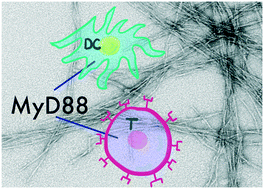MyD88 in antigen-presenting cells is not required for CD4+ T-cell responses during peptide nanofiber vaccination†
Abstract
Self-assembled peptide nanofibers raise significant antibody and T cell responses without adjuvants, but the mechanism by which they achieve this has not been fully elucidated. Myeloid differentiation primary response gene 88 (MyD88) has previously been shown to be critical for the antibody response to antigens presented by peptide nanofibers. The present study sought to determine the cell subset in which MyD88 is essential for T cell responses. Mice deficient in MyD88 or CD11c+ cells had severely attenuated T cell responses. However, mice lacking MyD88 in only CD11c+ cells remained capable of internalizing, processing, and presenting nanofiber-derived epitopes to stimulate T cell responses. The necessity of the inflammasome pathway was ruled out. Using adoptive transfer models where MyD88 was eliminated in CD4+ T cells or in the host, we observed that deficiency only in T cells or only in the host had no impact on the T cell response to nanofiber vaccines. Therefore, knocking out MyD88 in either antigen-presenting cells (APCs) or CD4 T cells could not compromise the CD4 T cell responses, suggesting that self-assembled peptide nanofibers trigger redundant MyD88-dependent and MyD88-independent signaling pathways in APCs and T cells. Similar redundancy has been observed for other adjuvants, and this is discussed.



 Please wait while we load your content...
Please wait while we load your content...